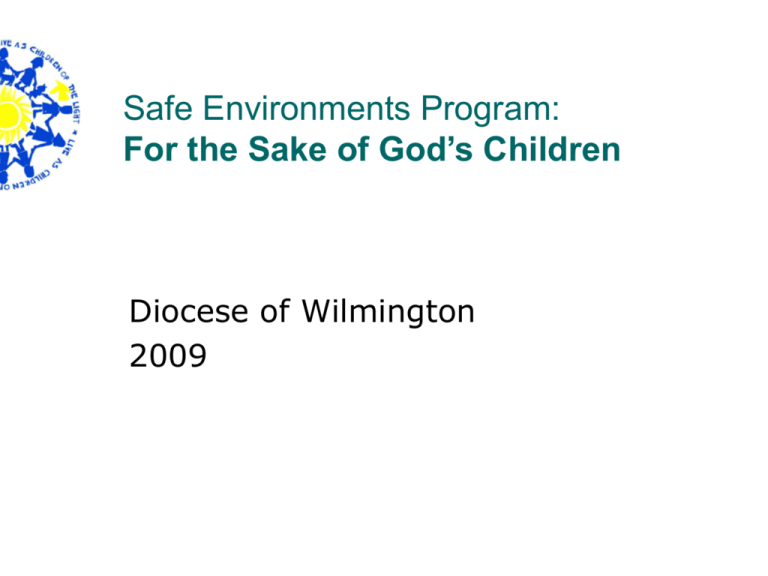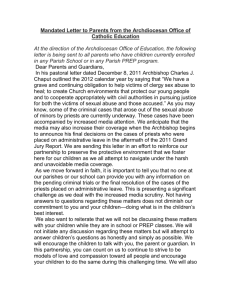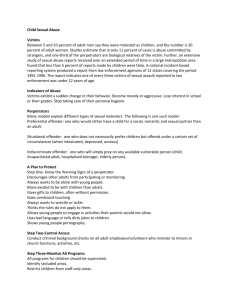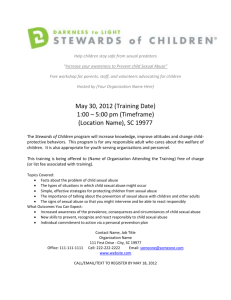Safe Environments - Catholic Diocese of Wilmington
advertisement

Safe Environments Program: For the Sake of God’s Children Diocese of Wilmington 2009 As a faith filled people we value and honor every individual as created in the image and likeness of God. We provide an environment where honesty, trust and mutual respect frame all relationships and clear behavioral standards are the norm. Diocesan Requirements Criminal background Renewed every five years Who/How/When Who does the actual clearances? What about background checks from other organizations/the state? Those done by other states? Who has access/how are they retained? Only the individual and the Coordinator of Safe Environments receive the report. They are stored in a secured external disk drive permanently. Role of the Review Panel Ethical Standards Basis for Standards: Self knowledge Appropriate Boundaries Accountability Who/How/When Church personnel will Exhibit the highest ethical standards and personal integrity reflective of the teachings of the Gospel. At all times conduct themselves in a professional manner including developing and maintaining the level of professional competence commensurate with their ministerial duties Witness God’s love for every person by sensitivity, reverence and respect of each individual with and to whom they minister. Be conscious of the unique power they have in relationships due to the trust they are given and the visibility of their witness and leadership. Assume the full burden for setting and maintaining clear, appropriate physical and emotional boundaries in all ministerial relationships. Avoid taking unfair advantage of ministerial relationships for the benefit of themselves or others. Not physically, sexually or emotionally abuse or neglect any person. Have a duty to report their own ethical and professional misconduct and the misconduct of others. Educational Processes include: Brochures for employees, families, parish communities and volunteers Video: Child Abuse, how to see it, how to stop it Diocesan Policy (REVIEW) Reporting Procedures When and how to report abuse Education for Children Curriculum : Keeping Our Promises pre k thru 12 based on the 11 characteristics of a safe environment. Posters Requirements for Religious Priests, Brothers and Sisters If they live in DOW and work here If they live here and work elsewhere If they live outside the Diocese and work here. If they are in retirement in the Diocese Religious Priests/Brothers/Sisters Statement of Suitability from Major Superior Criminal Background Check Ethical Standards Educational Process provided by the Diocese. Education Is Essential What is child abuse? The four types of abuse Physical Abuse Neglect Sexual Abuse Emotional Abuse Signs of Abuse Be aware that the presence of one sign does not necessarily indicate abuse. Realize that the presence of a number of these signs may be reason for concern and possible exploration . No single sign proves a child has been mistreated but when signs appear repeatedly this should prompt heightened concern. Signs of Sexual Abuse Avoidance that is confusing or of concern Hyperactivity Fear of previously likeable places or people New words for private body parts Talking about a new older friend Refusing to talk about a “secret” that she or he has with an adult or older child. Self destructive behaviors Who is an Abuser The most common sex offender is: Male Married Knows the victim All socio economic classifications Every religious background Every career base Types of Offenders Opportunist: seeks children regularly until caught Pedophile : has no sexual interest in adults and is sexually attracted to only children under the age of thirteen. Sex Offender: an individual who is drawn to children for sexual exploitation. Warning Signs of a Sexual Predator SOME SIGNS MAY INCLUDE: Insists on hugging, touching, kissing, tickling, wrestling with or holding a child even when the child does not want this affection Is overly interested in the sexuality of a particular child or teen. Manages to get time alone or insists on time alone with a child with no interruptions…a weekend sleepover. Spends most of his or her spare time with children or teens and has little interest in spending time with someone of his or her own age. Regularly offers to take children on outings alone. Buys expensive gifts or gives money for no apparent reason. Frequently walks in on children or teens in the bathroom Allows children or teens to consistently get away with inappropriate behaviors. Whose Problem Is This? Child Abuse is the horrific reality of our society. Every 2 minutes a child is abused (four types) 85% or more know the abuser well One in four girls and one in six boys is victimized by age 18 Myths Most sexual offenders are strangers FACT Most sexual assaults are committed by someone familiar to the victim The majority of sexual offenders are caught, convicted and sentenced to prison. FACT Only a small fraction of those who commit sexual assault are apprehended and convicted for their crimes. Statistics More than 90% of abusers are parents, brothers, sisters or close relatives, the age of abusers is dropping and we now have children abusing children. Other professions where abusers are identifiable: teachers, school bus drivers, coaches, scout leaders, counselors, ministers of other denominations, school principal. 95% of child abusers were abused as children. Appropriate Boundaries for Relationships PRINCIPLES Know yourself --- what you know and can do and what is best referred elsewhere. Diocesan resourcing and beyond. Establish limits --- personal space, time, resources Be accountable --- to self, the diocese and the state laws. Build A Safe Environment For Everyone Expectations Know the physical plant and be sure that access areas are appropriately lighted (back entrances should not be used for public access, especially not to give entry to young people). Use the two adult standard and the buddy system with kids…… don’t be alone with children. Use computer equipment responsibly recognizing the growing access to pornography/internet access. Pornography 22% of teen girls say they electronically sent or posted online nude or semi-nude self images. 33% teen boys and 25% teen girls say they have shared images meant to be private. Sleepovers with 13 -14 year old girls who gather to watch porn to learn about sex and what boys want Every second $3,075 is being spent on pornography The porn industry is larger than the revenues of the top technology companies combined. Hollywood produces 400 feature films a year and the porn industry churns out 11,000 70% of 15-17 year olds said they accidentally came across pornography on line. Child pornography is illegal, not protected by the 1st Amendment. Data from presentation at National Coordinator of Safe Environments 2009 What can adults provide? Boundaries appropriate to the relationship Trained and honest leaders Being aware that the facility is secure Be properly trained to respond to emergency situations Report inappropriate behaviors Earn respect Be a positive role model Remain free from unwarranted suspicion. VICTIM’S ASSISTANCE OFFICE AND SERVICES Peg McLaughlin Contact thru Catholic Charities Expectations of the Diocese about when and how to report If anyone has cause to believe that abuse has occurred or receives a report of such an act , a report of the incident must be made immediately to the appropriate state authority. Immediately thereafter, the individual should promptly notify the Vicar General for Administration. (See brochure for phone numbers.) For The Sake Of God’s Children Diocesan Safe Environment Program Level Of Compliance: Compliance Oversight Committee Level Of Cooperation in Diocese Leadership Role/Responsibilities Parish Team/Compliance Person Materials available upon request: Video Brochures Posters Program Manual Curriculum Use Of Bulletin/Parish Newsletter And Parish Website as tools for information and education. To minister in the name of Jesus Christ is a great privilege and tremendous responsibility. As ministers of the Lord we must act in ways that are in conformity with the attitudes and actions He lived and taught. Letter of Bishop Michael Saltarelli May 2003 calling for the implementation of For the Sake of God’s Children.





